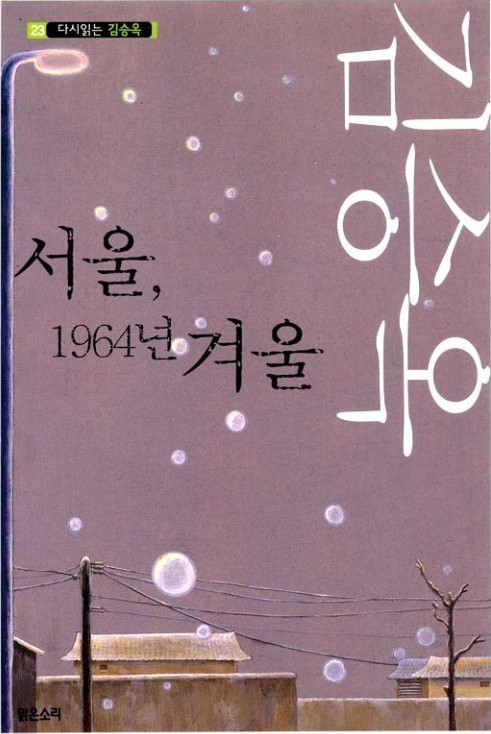Book
Are We the Twenty-Five of 1964?
Indifferent Modern Individuals Seen Through the Book
By Yu-jeong Jang
2024-11-11
The drama series ‘Reply’, popular in the 2010s, offers a glimpse into people's lives in the 1980s and 1990s. In ‘Reply 1988’, there is a scene where neighbors living on the same street share their dinner side dishes. It has been over 30 years since the 1990s, and people today often do not even know who lives in their neighborhood or next door. This growing indifference and emotional numbness toward one another were something Kim Seung-ok recognized as early as 1964, as expressed in his novel "Seoul, Winter 1964."
‘Seoul, Winter 1964’ is a short story by Kim Seung-ok, first published in a political magazine in June 1965. The book tells the story of three men meeting one evening in Seoul during the winter of 1964. The story reflects the apathy and exclusivity of the era after the Korean War, revealing the dark lives of individuals living in that society during the 1960s. Through vivid descriptions and concise expressions, it tells a story of tragic events and the indifferent attitudes of the characters involved.
The story features three main characters: the narrator, who is 25 years old and failed the military academy entrance exam, ‘Ann’ a graduate student the same age as the narrator, and a ‘man’ who has sold his deceased wife's body for money. The narrator meets Ann in a bar, and as they share their thoughts about Seoul, the man joins their conversation. The three men drink together, and then they decide to head to an inn. When they arrive at the inn, the man desperately requests the narrator and Ann to share a room, but the narrator and Ann refuse. The following day, the narrator and Ann discover that the man has committed suicide. Ann and the narrator leave the motel in a hurry, and just before they part, Ann asks, "Are we twenty-five?" saying that it feels that he has gotten so old.
In the 1960s, South Korea experienced rapid industrialization and modernization while simultaneously dealing with the remnants of the Korean War. This decade was chaotic, with social issues such as ongoing political instability and national security threats. Kim Seung-ok, an intellectual who graduated from Seoul National University, perceived South Korea's society as cold and cruel, which he expressed by setting the story's background to winter.
The characters and dialogues convey this sentiment in his story. The character known as "the man" shows ongoing mental instability throughout the story and suggests sharing a room in the inn, hinting at the suicide that he committed later in the story. However, the narrator and Ann find it bothersome to comfort him and choose to ignore his distress. The two young men also use fake names when booking their room to dodge blame, showing they have already realized the problem that would happen the next day. Ann's question at the end, "Are we twenty-five?" and his remark about feeling too old, show how they have become indifferent even at a young age, highlighting the apathy of that era.
The character arcs of the narrator and Ann in "Seoul, Winter 1964" mirror those of modern individuals in 2024. Busy individuals in South Korea are increasingly becoming indifferent, and people are becoming increasingly selfish as they compete from a young age. They have lost the capacity to look over the people around them. This story tells us the tragedy of indifference while offering us a chance to consider the importance of looking after each other.


ⓒ 2025 The Gachon Herald
POWERED BY YANGSOFT